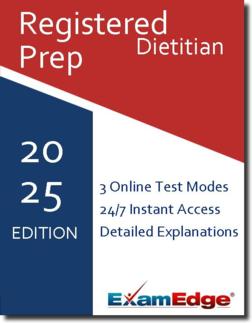Registered Dietitian (RD) Practice Tests & Test Prep by Exam Edge - Topics
Based on 32 Reviews
- Real Exam Simulation: Timed questions and matching content build comfort for your Registered Dietitian test day.
- Instant, 24/7 Access: Web-based Registered Dietitian practice exams with no software needed.
- Clear Explanations: Step-by-step answers and explanations for your Registered exam to strengthen understanding.
- Boosted Confidence: Reduces anxiety and improves test-taking skills to ace your Registered Dietitian (RD).

Understanding the exact breakdown of the Registered Dietitian test will help you know what to expect and how to most effectively prepare. The Registered Dietitian has multiple-choice questions The exam will be broken down into the sections below:
| Registered Dietitian Exam Blueprint | ||
|---|---|---|
| Domain Name | % | Number of Questions |
| Food and Nutrition Sciences | 12% | 12 |
| Nutrition Care for Individuals and Groups | 50% | 50 |
| Management of Food and Nutrition Programs and Services | 21% | 21 |
| Foodservice System | 17% | 17 |


